-
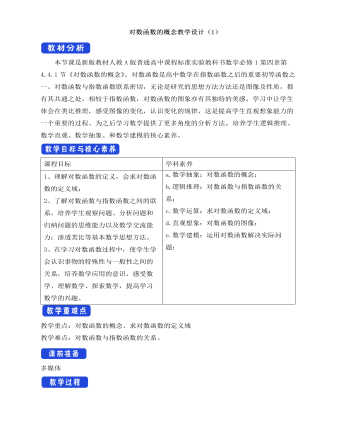
人教A版高中数学必修一对数函数的概念教学设计(1)
本节课是新版教材人教A版普通高中课程标准实验教科书数学必修1第四章第4.4.1节《对数函数的概念》。对数函数是高中数学在指数函数之后的重要初等函数之一。对数函数与指数函数联系密切,无论是研究的思想方法方法还是图像及性质,都有其共通之处。相较于指数函数,对数函数的图象亦有其独特的美感。学习中让学生体会在类比推理,感受图像的变化,认识变化的规律,这是提高学生直观想象能力的一个重要的过程。为之后学习数学提供了更多角度的分析方法。培养学生逻辑推理、数学直观、数学抽象、和数学建模的核心素养。1、理解对数函数的定义,会求对数函数的定义域;2、了解对数函数与指数函数之间的联系,培养学生观察问题、分析问题和归纳问题的思维能力以及数学交流能力;渗透类比等基本数学思想方法。3、在学习对数函数过程中,使学生学会认识事物的特殊性与一般性之间的关系,培养数学应用的意识,感受数学、理解数学、探索数学,提高学习数学的兴趣。
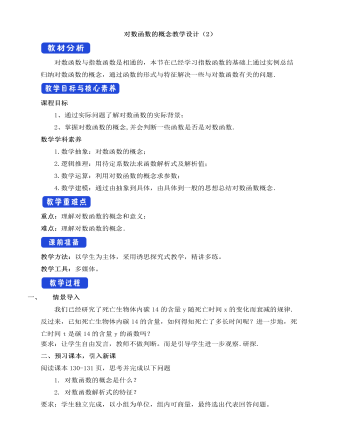
人教A版高中数学必修一对数函数的概念教学设计(2)
对数函数与指数函数是相通的,本节在已经学习指数函数的基础上通过实例总结归纳对数函数的概念,通过函数的形式与特征解决一些与对数函数有关的问题.课程目标1、通过实际问题了解对数函数的实际背景;2、掌握对数函数的概念,并会判断一些函数是否是对数函数. 数学学科素养1.数学抽象:对数函数的概念;2.逻辑推理:用待定系数法求函数解析式及解析值;3.数学运算:利用对数函数的概念求参数;4.数学建模:通过由抽象到具体,由具体到一般的思想总结对数函数概念.重点:理解对数函数的概念和意义;难点:理解对数函数的概念.教学方法:以学生为主体,采用诱思探究式教学,精讲多练。教学工具:多媒体。一、 情景导入我们已经研究了死亡生物体内碳14的含量y随死亡时间x的变化而衰减的规律.反过来,已知死亡生物体内碳14的含量,如何得知死亡了多长时间呢?进一步地,死亡时间t是碳14的含量y的函数吗?
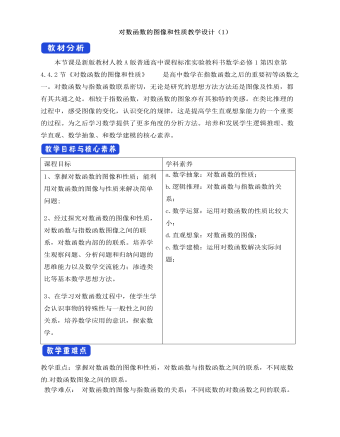
人教A版高中数学必修一对数函数的图像和性质教学设计(1)
本节课是新版教材人教A版普通高中课程标准实验教科书数学必修1第四章第4.4.2节《对数函数的图像和性质》 是高中数学在指数函数之后的重要初等函数之一。对数函数与指数函数联系密切,无论是研究的思想方法方法还是图像及性质,都有其共通之处。相较于指数函数,对数函数的图象亦有其独特的美感。在类比推理的过程中,感受图像的变化,认识变化的规律,这是提高学生直观想象能力的一个重要的过程。为之后学习数学提供了更多角度的分析方法。培养和发展学生逻辑推理、数学直观、数学抽象、和数学建模的核心素养。1、掌握对数函数的图像和性质;能利用对数函数的图像与性质来解决简单问题;2、经过探究对数函数的图像和性质,对数函数与指数函数图像之间的联系,对数函数内部的的联系。培养学生观察问题、分析问题和归纳问题的思维能力以及数学交流能力;渗透类比等基本数学思想方法。
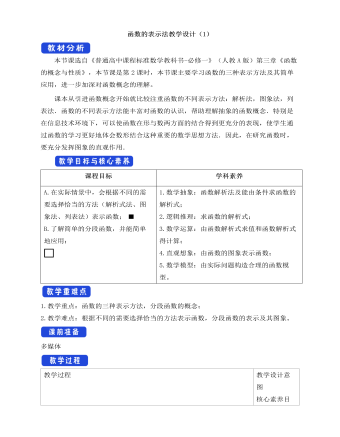
人教A版高中数学必修一函数的表示法教学设计(1)
本节课选自《普通高中课程标准数学教科书-必修一》(人教A版)第三章《函数的概念与性质》,本节课是第2课时,本节课主要学习函数的三种表示方法及其简单应用,进一步加深对函数概念的理解。课本从引进函数概念开始就比较注重函数的不同表示方法:解析法,图象法,列表法.函数的不同表示方法能丰富对函数的认识,帮助理解抽象的函数概念.特别是在信息技术环境下,可以使函数在形与数两方面的结合得到更充分的表现,使学生通过函数的学习更好地体会数形结合这种重要的数学思想方法.因此,在研究函数时,要充分发挥图象的直观作用.课程目标 学科素养A.在实际情景中,会根据不同的需要选择恰当的方法(解析式法、图象法、列表法)表示函数;B.了解简单的分段函数,并能简单地应用;1.数学抽象:函数解析法及能由条件求函数的解析式;2.逻辑推理:求函数的解析式;
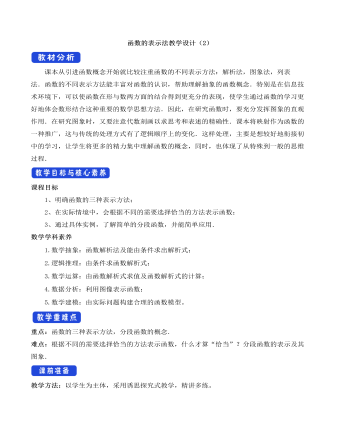
人教A版高中数学必修一函数的表示法教学设计(2)
课本从引进函数概念开始就比较注重函数的不同表示方法:解析法,图象法,列表法.函数的不同表示方法能丰富对函数的认识,帮助理解抽象的函数概念.特别是在信息技术环境下,可以使函数在形与数两方面的结合得到更充分的表现,使学生通过函数的学习更好地体会数形结合这种重要的数学思想方法.因此,在研究函数时,要充分发挥图象的直观作用.在研究图象时,又要注意代数刻画以求思考和表述的精确性.课本将映射作为函数的一种推广,这与传统的处理方式有了逻辑顺序上的变化.这样处理,主要是想较好地衔接初中的学习,让学生将更多的精力集中理解函数的概念,同时,也体现了从特殊到一般的思维过程.课程目标1、明确函数的三种表示方法;2、在实际情境中,会根据不同的需要选择恰当的方法表示函数;3、通过具体实例,了解简单的分段函数,并能简单应用.
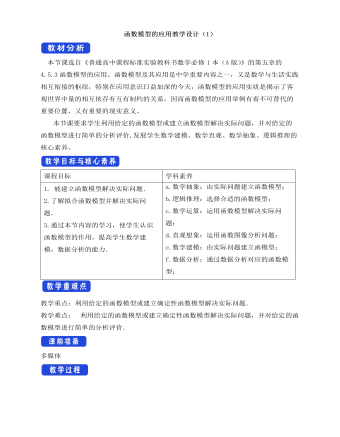
人教A版高中数学必修一函数模型的应用教学设计(1)
本节课选自《普通高中课程标准实验教科书数学必修1本(A版)》的第五章的4.5.3函数模型的应用。函数模型及其应用是中学重要内容之一,又是数学与生活实践相互衔接的枢纽,特别在应用意识日益加深的今天,函数模型的应用实质是揭示了客观世界中量的相互依存有互有制约的关系,因而函数模型的应用举例有着不可替代的重要位置,又有重要的现实意义。本节课要求学生利用给定的函数模型或建立函数模型解决实际问题,并对给定的函数模型进行简单的分析评价,发展学生数学建模、数学直观、数学抽象、逻辑推理的核心素养。1. 能建立函数模型解决实际问题.2.了解拟合函数模型并解决实际问题.3.通过本节内容的学习,使学生认识函数模型的作用,提高学生数学建模,数据分析的能力. a.数学抽象:由实际问题建立函数模型;b.逻辑推理:选择合适的函数模型;c.数学运算:运用函数模型解决实际问题;
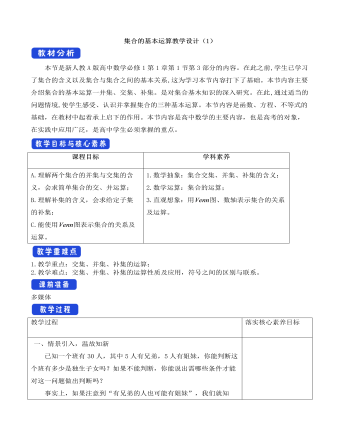
人教A版高中数学必修一集合的基本运算教学设计(1)
本节是新人教A版高中数学必修1第1章第1节第3部分的内容。在此之前,学生已学习了集合的含义以及集合与集合之间的基本关系,这为学习本节内容打下了基础。本节内容主要介绍集合的基本运算一并集、交集、补集。是对集合基木知识的深入研究。在此,通过适当的问题情境,使学生感受、认识并掌握集合的三种基本运算。本节内容是函数、方程、不等式的基础,在教材中起着承上启下的作用。本节内容是高中数学的主要内容,也是高考的对象,在实践中应用广泛,是高中学生必须掌握的重点。A.理解两个集合的并集与交集的含义,会求简单集合的交、并运算;B.理解补集的含义,会求给定子集的补集;C.能使用 图表示集合的关系及运算。 1.数学抽象:集合交集、并集、补集的含义;2.数学运算:集合的运算;3.直观想象:用 图、数轴表示集合的关系及运算。
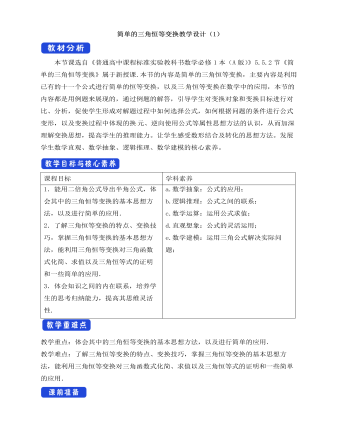
人教A版高中数学必修一简单的三角恒等变换教学设计(1)
四、小结1.知识:如何采用两角和或差的正余弦公式进行合角,借助三角函数的相关性质求值.其中三角函数最值问题是对三角函数的概念、图像和性质,以及诱导公式、同角三角函数基本关系、和(差)角公式的综合应用,也是函数思想的具体体现. 如何科学的把实际问题转化成数学问题,如何选择自变量建立数学关系式;求解三角函数在某一区间的最值问题.2.思想:本节课通过由特殊到一般方式把关系式 化成 的形式,可以很好地培养学生探究、归纳、类比的能力. 通过探究如何选择自变量建立数学关系式,可以很好地培养学生分析问题、解决问题的能力和应用意识,进一步培养学生的建模意识.五、作业1. 课时练 2. 预习下节课内容学生根据课堂学习,自主总结知识要点,及运用的思想方法。注意总结自己在学习中的易错点;
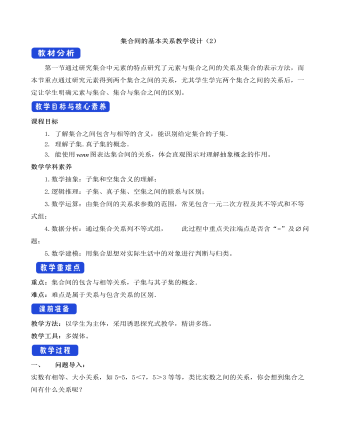
人教A版高中数学必修一集合间的基本关系教学设计(2)
第一节通过研究集合中元素的特点研究了元素与集合之间的关系及集合的表示方法,而本节重点通过研究元素得到两个集合之间的关系,尤其学生学完两个集合之间的关系后,一定让学生明确元素与集合、集合与集合之间的区别。课程目标1. 了解集合之间包含与相等的含义,能识别给定集合的子集.2. 理解子集.真子集的概念. 3. 能使用 图表达集合间的关系,体会直观图示对理解抽象概念的作用。数学学科素养1.数学抽象:子集和空集含义的理解;2.逻辑推理:子集、真子集、空集之间的联系与区别;3.数学运算:由集合间的关系求参数的范围,常见包含一元二次方程及其不等式和不等式组;4.数据分析:通过集合关系列不等式组, 此过程中重点关注端点是否含“=”及 问题;5.数学建模:用集合思想对实际生活中的对象进行判断与归类。
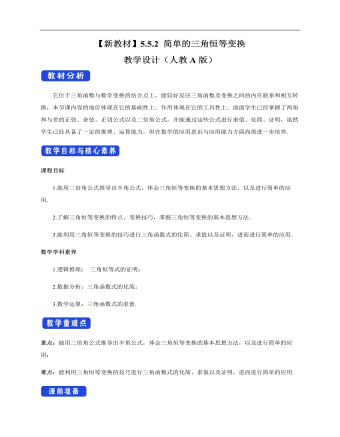
人教A版高中数学必修一简单的三角恒等变换教学设计(2)
它位于三角函数与数学变换的结合点上,能较好反应三角函数及变换之间的内在联系和相互转换,本节课内容的地位体现在它的基础性上。作用体现在它的工具性上。前面学生已经掌握了两角和与差的正弦、余弦、正切公式以及二倍角公式,并能通过这些公式进行求值、化简、证明,虽然学生已经具备了一定的推理、运算能力,但在数学的应用意识与应用能力方面尚需进一步培养.课程目标1.能用二倍角公式推导出半角公式,体会三角恒等变换的基本思想方法,以及进行简单的应用. 2.了解三角恒等变换的特点、变换技巧,掌握三角恒等变换的基本思想方法. 3.能利用三角恒等变换的技巧进行三角函数式的化简、求值以及证明,进而进行简单的应用. 数学学科素养1.逻辑推理: 三角恒等式的证明; 2.数据分析:三角函数式的化简; 3.数学运算:三角函数式的求值.
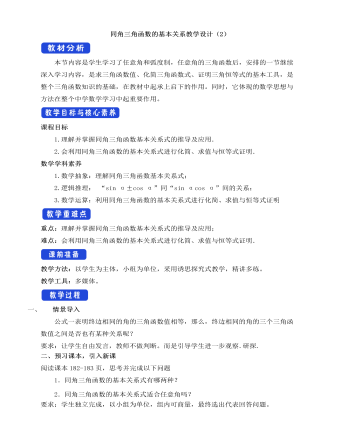
人教A版高中数学必修一同角三角函数的基本关系教学设计(2)
本节内容是学生学习了任意角和弧度制,任意角的三角函数后,安排的一节继续深入学习内容,是求三角函数值、化简三角函数式、证明三角恒等式的基本工具,是整个三角函数知识的基础,在教材中起承上启下的作用。同时,它体现的数学思想与方法在整个中学数学学习中起重要作用。课程目标1.理解并掌握同角三角函数基本关系式的推导及应用.2.会利用同角三角函数的基本关系式进行化简、求值与恒等式证明.数学学科素养1.数学抽象:理解同角三角函数基本关系式;2.逻辑推理: “sin α±cos α”同“sin αcos α”间的关系;3.数学运算:利用同角三角函数的基本关系式进行化简、求值与恒等式证明重点:理解并掌握同角三角函数基本关系式的推导及应用; 难点:会利用同角三角函数的基本关系式进行化简、求值与恒等式证明.
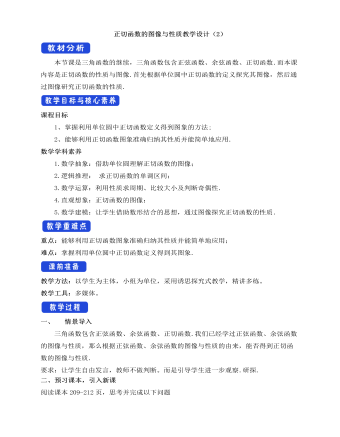
人教A版高中数学必修一正切函数的图像与性质教学设计(2)
本节课是三角函数的继续,三角函数包含正弦函数、余弦函数、正切函数.而本课内容是正切函数的性质与图像.首先根据单位圆中正切函数的定义探究其图像,然后通过图像研究正切函数的性质. 课程目标1、掌握利用单位圆中正切函数定义得到图象的方法;2、能够利用正切函数图象准确归纳其性质并能简单地应用.数学学科素养1.数学抽象:借助单位圆理解正切函数的图像; 2.逻辑推理: 求正切函数的单调区间;3.数学运算:利用性质求周期、比较大小及判断奇偶性.4.直观想象:正切函数的图像; 5.数学建模:让学生借助数形结合的思想,通过图像探究正切函数的性质. 重点:能够利用正切函数图象准确归纳其性质并能简单地应用; 难点:掌握利用单位圆中正切函数定义得到其图象.
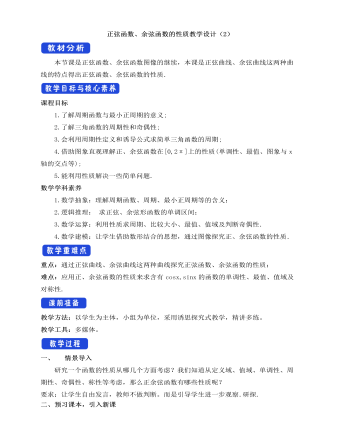
人教A版高中数学必修一正弦函数、余弦函数的性质教学设计(2)
本节课是正弦函数、余弦函数图像的继续,本课是正弦曲线、余弦曲线这两种曲线的特点得出正弦函数、余弦函数的性质. 课程目标1.了解周期函数与最小正周期的意义;2.了解三角函数的周期性和奇偶性;3.会利用周期性定义和诱导公式求简单三角函数的周期;4.借助图象直观理解正、余弦函数在[0,2π]上的性质(单调性、最值、图象与x轴的交点等);5.能利用性质解决一些简单问题. 数学学科素养1.数学抽象:理解周期函数、周期、最小正周期等的含义; 2.逻辑推理: 求正弦、余弦形函数的单调区间;3.数学运算:利用性质求周期、比较大小、最值、值域及判断奇偶性.4.数学建模:让学生借助数形结合的思想,通过图像探究正、余弦函数的性质.重点:通过正弦曲线、余弦曲线这两种曲线探究正弦函数、余弦函数的性质; 难点:应用正、余弦函数的性质来求含有cosx,sinx的函数的单调性、最值、值域及对称性.
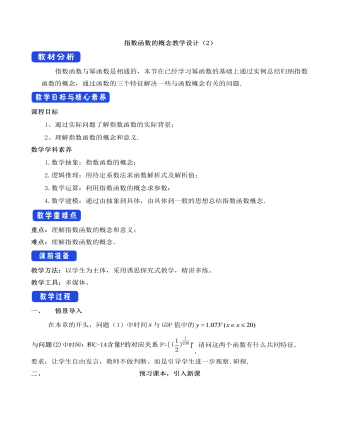
人教A版高中数学必修一指数函数的概念教学设计(2)
指数函数与幂函数是相通的,本节在已经学习幂函数的基础上通过实例总结归纳指数函数的概念,通过函数的三个特征解决一些与函数概念有关的问题.课程目标1、通过实际问题了解指数函数的实际背景;2、理解指数函数的概念和意义.数学学科素养1.数学抽象:指数函数的概念;2.逻辑推理:用待定系数法求函数解析式及解析值;3.数学运算:利用指数函数的概念求参数;4.数学建模:通过由抽象到具体,由具体到一般的思想总结指数函数概念.重点:理解指数函数的概念和意义;难点:理解指数函数的概念.教学方法:以学生为主体,采用诱思探究式教学,精讲多练。教学工具:多媒体。一、 情景导入在本章的开头,问题(1)中时间 与GDP值中的 ,请问这两个函数有什么共同特征.要求:让学生自由发言,教师不做判断。而是引导学生进一步观察.研探.
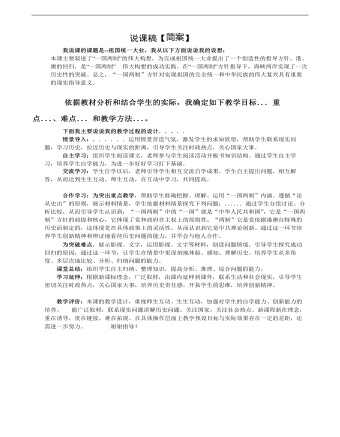
高中历史人教版必修一《第22课祖国统一大业(简案)》说课稿
情景导入:......运用情景营造气氛,激发学生的求知欲望,帮助学生联系现实问题,学习历史,拉近历史与现实的距离,引导学生关注时政热点,关心国家大事。自主学习:组织学生阅读课文,老师参与学生阅读活动并板书知识结构。通过学生自主学习,培养学生自学能力,为进一步好好学习打下基础。交流学习:学生自学以后,老师引导学生相互交流自学成果,学生自主提出问题,相互解答,从而达到生生互动、师生互动,在互动中学习,共同提高
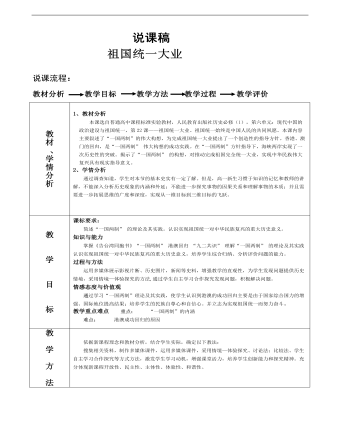
高中历史人教版必修一《第22课祖国统一大业》说课稿
1、教材分析 本课选自普通高中课程标准实验教材,人民教育出版社历史必修(1),第六单元:现代中国的政治建设与祖国统一,第22课——祖国统一大业。祖国统一始终是中国人民的共同夙愿。本课内容主要叙述了“一国两制”的伟大构想,为完成祖国统一大业提出了一个创造性的指导方针。香港、澳门的回归,是“一国两制” 伟大构想的成功实践。在“一国两制”方针指导下,海峡两岸实现了一次历史性的突破。揭示了“一国两制” 的构想,对推动完成祖国完全统一大业,实现中华民族伟大复兴具有现实指导意义。 2、学情分析通过调查知道,学生对本节的基本史实有一定了解。但是,高一新生习惯于知识的记忆和教师的讲解,不能深入分析历史现象的内涵和外延;不能进一步探究事物的因果关系和理解事物的本质;并且需要进一步拓展思维的广度和深度,实现从一维目标到三维目标的飞跃。
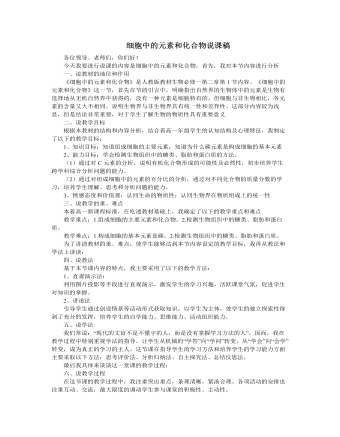
人教版高中生物必修1细胞中的元素和化合物说课稿
一、说教材的地位和作用《细胞中的元素和化合物》是人教版教材生物必修一第二章第1节内容。《细胞中的元素和化合物》这一节,首先在节的引言中,明确指出自然界的生物体中的元素是生物有选择地从无机自然界中获得的,没有一种元素是细胞特有的。但细胞与非生物相比,各元素的含量又大不相同。说明生物界与非生物界具有统一性和差异性。这部分内容较为浅显,但是结论非常重要,对于学生了解生物的物质性具有重要意义二、说教学目标根据本教材的结构和内容分析,结合着高一年级学生的认知结构及心理特征,我制定了以下的教学目标:1、知识目标:知道组成细胞的主要元素;知道为什么碳元素是构成细胞的基本元素2、能力目标:学会检测生物组织中的糖类、脂肪和蛋白质的方法。(1)通过对C元素的分析,说明有机化合物形成的可能性及必然性,初步培养学生跨学科综合分析问题的能力。(2)通过对组成细胞中的元素的百分比的分析,通过对不同化合物的质量分数的学习,培养学生理解、思考和分析问题的能力。
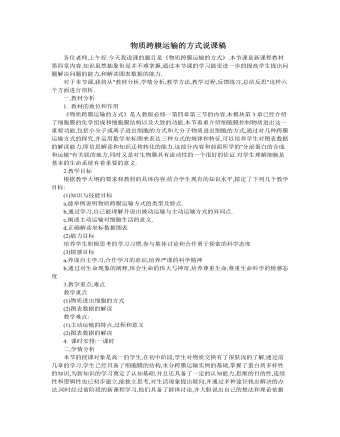
人教版高中生物必修1物质跨膜运输的方式说课稿
(4)提出问题:三种运输方式有哪些异同 组织学生分析填表,反馈和纠正.提出问题:影响自由扩散,协助扩散和主动运输速度的主要因素各是什么 画出细胞对某物的自由扩散,协助扩散和主动运输速度随细胞外浓度的改变而变化的曲线图组织学生分组讨论,并作图,展示各组的成果.教学说明:本环节巩固理论知识是对课本知识扩展和对重点,难点内容的深入理解和总结,只有理解了三种运输方式的异同,才能完成本环节教学任务,既突显书本知识,又培养学生的团结协作的精神,提高学生制做图表的能力和抽象化思维能力的形成.2.大分子的运输引导学生回忆分泌蛋白的分泌过程,得出胞吐现象,提出问题:那大家知道白细胞是如何吃掉病菌的吗 显示有关图片.强调:胞吞和胞吐作用都需要能量提出问题:胞吞和胞吐体现了细胞膜结构的特点是什么 与书本前面知识相联系.(四)技能训练指导学生就《技能训练》部分进行讨论五,反馈练习1.教师小结几种运输方式,特别是自由扩散,协助扩散和主动运输的特点
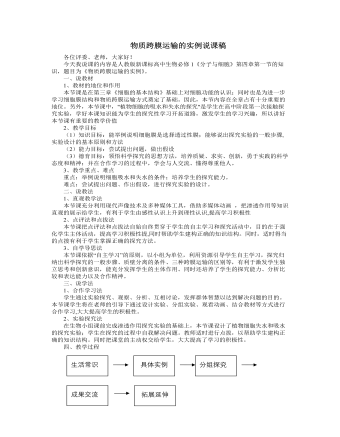
人教版高中生物必修1物质跨膜运输的实例说课稿
(四)、成果交流教师出示成熟植物细胞图,提出原生质层的概念,小组交流,教师点拨,得出结论:1、原生质层相当于半透膜2、外界溶液浓度大于细胞液浓度---细胞失水(质壁分离)3、外界溶液浓度小于细胞液浓度---细胞失水(质壁分离复原)教师出示有关细胞选择性吸收离子的数据资料。引导学生发现并探究出不同植物对同一离子吸收量不同,同一植物对不同离子吸收量也不同,得出结论:4、细胞膜具有选择透过性(五)拓展延伸如何用已有知识和技能鉴别两种蔗糖溶液浓度的大小?用0.1g/mg 0.8g/mg的蔗糖溶液分别做前面的探究实验会有什么不同的结果?你得出的结论是什么?引导学生总结出发生质壁分离和质壁分离复原的条件。五、板书设计好的板书就像一份微型教案,此板书力图全面而简明的将授课内容传递给学生,清晰直观,便于学生理解和记忆,理清文章脉络。
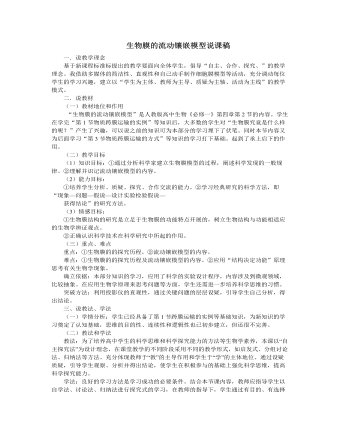
人教版高中生物必修1生物膜的流动镶嵌模型说课稿
二、流动镶嵌模型的基本内容1、膜的成分2、膜的基本支架3、膜的结构特点4、膜的功能特性设计意图:我根据板书的“规范、工整和美观”的要求,结合所教的内容,设计了如图所示的板书,使学生对本节课有一个整体的思路。八、教学反思:本节课我创设了问题情境来引导学生主动学习,利用了多媒体信息技术激发学生的学习热情,调动了学生的积极性,成功实现预期的教学目标。体现了学生为主体地位的新课程理念。启发式、探究式的教学方法以及由教师指导下的学生自主阅读、合作交流的学习方法把学生从死记知识的苦海中解救出来。初次的尝试还存在一定的缺陷,学生不能够很好的把知识和习题联系,只是把他所知道的知识简单罗列,不能够体现出能力的训练。在上课中发现学生比较腼腆或拘束,声音比较小,表达不能到位。尽管本节课存在诸多不足之处,但是也让我看到了闪光点:学生比较欢迎这样一堂自己是主角的课堂。





















